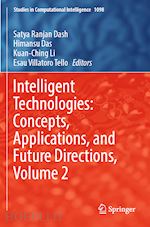
Questo prodotto usufruisce delle SPEDIZIONI GRATIS
selezionando l'opzione Corriere Veloce in fase di ordine.
Pagabile anche con Carta della cultura giovani e del merito, 18App Bonus Cultura e Carta del Docente
Detection of Brain Abnormalities from Spontaneous Electroencephalography using Spiking Neural Network.- QoS the enhanced energy Aware task Scheduling Models in cloud computing.- Clinical decision support system for diagnosis and treatment of COPD using ensemble methods.- Test Scenarios Generation and Optimization of Object-oriented Models using Meta-heuristic Algorithms.- Loss Allocation Techniques in Active Power Distribution Systems.
Dr. Satya Ranjan Dash is currently working as an associate professor at KIIT University, India. His current research includes Epileptic Seizure Detection based on EEG Signal through Spiking neural network (SNN), Classification of Schizophrenia Patients from EEG and fMRI using SNN and SSN, fetal heart rate signals classification through extreme learning machine (ELM), Mammogram Analysis with Local binary pattern (LBP) and generative adversarial network (GAN) model.
Dr. Himansu Das, works as Associate Professor in the School of Computer Engineering, Kalinga Institute of Industrial Technology (KIIT), Deemed to be University, Bhubaneswar, India. He has been received Ph.D. in Engineering (Computer Sc. & Engg.) degree from Veer Surendra Sai University of Technology (VSSUT), Odisha. He has been received M.Tech degree in Computer Sc. Engg. from the National Institute of Science and Technology, Odisha. He has also received B.Tech degree fromthe Institute of Technical Education and Research, Odisha, India. He has published several research papers in various international journals and has presented at conferences. He has also edited several books published by IGI Global, Springer, CRC press, and Elsevier. He has also served on many journals and conferences as editorial or reviewer board member. He is proficient in the field of Computer Science Engineering and served as an organizing chair, a publicity chair and acted as a member of the technical program committees of many national and international conferences. He is also associated with various educational and research societies such as IET, IACSIT, ISTE, UACEE, CSI, IAENG, and ISCA. His research interests include the field of Data Mining, Soft Computing, and Machine Learning. He has also more than twelve years of teaching and research experience in various engineering colleges and universities.
Dr. Kuan-Ching Li is currently a Professor in the Department of Computer Science and Information Engineering at the Providence University, Taiwan.Dr. Li is the Editor-in-Chief of technical publications International Journal of Computational Science and Engineering (IJCSE), International Journal of Embedded Systems (IJES) and International Journal of High Performance Computing and Networking (IJHPCN), all published by Interscience, also serving a number of journal’s editorial boards and guest editorship. His topics of interest include networked computing, GPU computing, parallel software design, and performance evaluation and benchmarking. Dr. Li is a Fellow of the IET and a senior member of the IEEE.
Dr. Esaú Villatoro Tello is currently full-time professor-researcher at the Universidad Autónoma Metropolitana Unidad Cuajimalpa (UAM-C) in Mexico City. From September 2019 to date he is a visiting professor at Idiap Research Institute, in Martigny, Switzerland. His main research interests are associated with Natural Language Processing (NLP) and Computational Linguistics topics, specifically he has done research on the topics of authorship analysis and authorship attribution, thematic and non-thematic text classification, plagiarism detection, information retrieval and NLP applied in psycho-linguistics for mental health support.











Il sito utilizza cookie ed altri strumenti di tracciamento che raccolgono informazioni dal dispositivo dell’utente. Oltre ai cookie tecnici ed analitici aggregati, strettamente necessari per il funzionamento di questo sito web, previo consenso dell’utente possono essere installati cookie di profilazione e marketing e cookie dei social media. Cliccando su “Accetto tutti i cookie” saranno attivate tutte le categorie di cookie. Per accettare solo deterninate categorie di cookie, cliccare invece su “Impostazioni cookie”. Chiudendo il banner o continuando a navigare saranno installati solo cookie tecnici. Per maggiori dettagli, consultare la Cookie Policy.